Mindful is the groundbreaking new magazine dedicated to helping you live mindfully. The simple practice of being in the moment brings out the best in who you are.
Rest, Renew, Restore
Mindful
What Does Your Practice Look Like? • Every mindfulness practice looks a bit different. Here are some of the ways our readers tap into a mindful moment off the meditation cushion.
TOP OF mind • Keep up with the latest in the world of mindfulness.
ACTS OF kindness
Research News • Research gathered from King’s College London, Toronto Centre for Addiction and Mental Health, University of Toronto, and University of Utah
AN OCEAN OF EASE
Teaching by Example
LIBRARIES MAKE Shh… HAPPEN • These libraries celebrate community through programming dedicated to exploring the humanity of readers and creating inclusive spaces—reminding us that we’re all interconnected.
MINDFUL OR MINDLESS? • Our take on who’s paying attention and who’s not
HOW TO STICK WITH YOUR PRACTICE • You may know that mindfulness can help you change your habits—but when it comes to building the habit of meditation, questions about how much to practice (and how to stick with it over time) may leave you shrugging your shoulders instead of relaxing them. Here are four research-based strategies to help you build a practice that works for you.
Meditate Every Day • Starting a practice that benefits your well-being, and sticking with it over time, doesn’t have to be a struggle. Here are a few evidence-based tips for integrating meditation into your life.
Breathe, and Begin Again • Mindfulness might sometimes feel like just another fad, destined to pass, like oxygen bars and Kardashians. But, Elaine Smookler writes, it takes grit and an ongoing intention toward well-being to keep mindfulness from becoming just another failure to make us thinner or less irritable. Instead, it offers a practical way to be awake to the dazzling experience of being alive.
No Wasted Moments
MANAGING STRESS TOGETHER • When it comes to workplace well-being and stress, mindfulness can go beyond the individual level. Research suggests that strengthening clear, vulnerable communication and working from the knowledge that we’re in this together can help transform the way we work.
Navigate Stress as a Team • Dr. Jutta Tobias Mortlock outlines how anticipating stress as a team and responding collectively can transform workplace challenges.
RECLAIM YOUR BRAIN From Tech • If we can pause, pay attention, and tap into our values, we can create habits that not only serve our interests, but support connection and meaning.
Get Real About YOUR TECH USE • How honest can you be about your use of technology? Try this journaling practice to get clear about your intentions and aspirations around your tech, and how your actions align with them. See how honest you can be—no need to judge yourself. The intention of this practice is to become clear about the habits that serve you and those that don’t. Once you have that information, you can make informed choices about your tech use.
exhale
LOVE IS ALREADY YOURS • When love feels scarce, we are conditioned to slip into survival mode. We cling to our beliefs about who we are in order to feel safe, to compensate for the belief that we are lacking. But seeing these conditioned habits for what they are can help can create pathways for returning, for remembrance, for releasing into our inherent belonging—into the heart of who we are.
THE JOURNEY TOWARD BELONGING • Caverly Morgan felt a call to reconcile the wisdom that arose from her mindfulness practice with the systems of oppression at work in our world. She explores that reconciliation in The Heart of Who We Are: Realizing Freedom Together. In this conversation with Mindful...
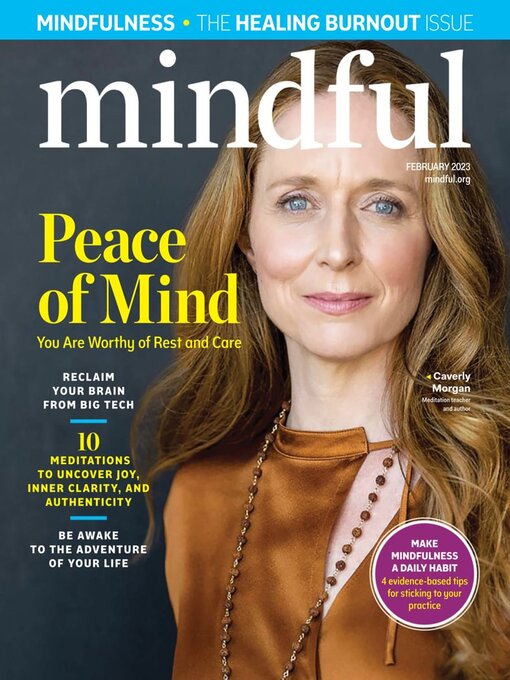
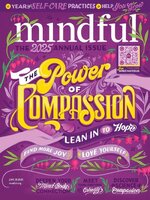 Mindful Annual 2025 - The Compassion Issue
Mindful Annual 2025 - The Compassion Issue
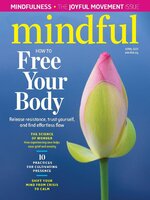 Apr 01 2023
Apr 01 2023
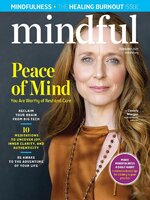 Feb 01 2023
Feb 01 2023
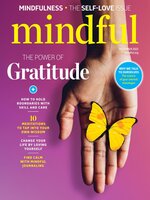 Dec 01 2022
Dec 01 2022
 Oct 01 2022
Oct 01 2022